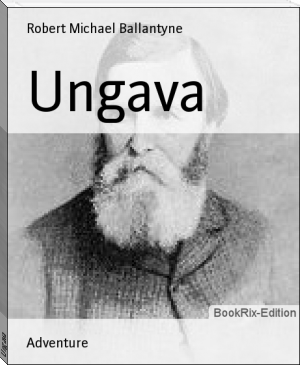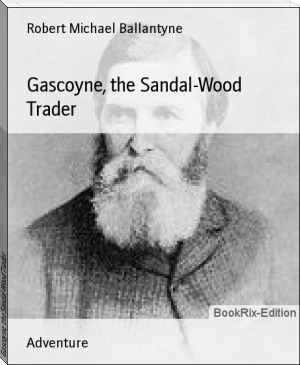Ungava by Robert Michael Ballantyne (new reading TXT) 📖

- Author: Robert Michael Ballantyne
Book online «Ungava by Robert Michael Ballantyne (new reading TXT) 📖». Author Robert Michael Ballantyne
But an event occurred at this time which put an end to their intercourse, and very much altered the aspect of affairs. For some time past the men at the fort had been subject to rather severe attacks of cold, or a species of influenza. This they unfortunately communicated to the Esquimaux, who seemed to be peculiarly susceptible of the disease. Being very fat and full-blooded, it had the most dreadful effect on the poor creatures, and at a certain stage almost choked them. At last one night it was reported that ten of their number had died from absolute suffocation. All of these had been strong and robust, and they died after two days' illness.
One of those who were attacked was Edith's little friend, Arnalooa, and just before the ten Esquimaux died, Edith had gone down to the camp with a present of beads to console her. She found her much better, and, after talking to her for some time, she took her leave, promising to pay her another visit next day. True to her promise, Edith sallied forth after breakfast with a little native basket on her arm. About half an hour afterwards, while Stanley was sitting in the hall with his wife and Frank, they were startled by the sudden appearance of Edith, out of breath from the speed with which she had run home, and her face overspread with a deadly paleness.
"What is the matter, my darling?" cried her mother, starting up in alarm.
"Oh! the Esquimaux are lying dead on the sand," gasped Edith, as she laid her head on her mother's breast, "and the rest are all gone."
Without waiting to hear more, Frank and Stanley took down their guns and hastened to the camp. Here a scene of the most horrible kind presented itself. The whole camp exhibited evidences of a hasty flight, and eight of the people who had died during the night were lying exposed on the rocks, with their white faces and ghastly eyeballs turned towards the sky. The other two had been buried on the rocks under a heap of stones, which did not conceal them entirely from view.
"No wonder poor Edith was alarmed," said Stanley sadly, as he leaned on his fowling-piece and surveyed the scene of desolation and death.
"I have been told," remarked Frank, "that the Esquimaux have a superstitious dread of this river. Oolibuck mentioned to me this morning that he has had a good deal of conversation with the natives about this disease, and they told him that it invariably attacks them when they enter this river, and carries them off by dozens; so that they never come into it except when they require wood, and always stay as short a time as possible."
"Ah! that's bad," said Stanley; "I fear that it will go much against the success of the establishment. But we must hope better things; and, truly, with this exception, all has gone well hitherto. Said they anything more, Frank?"
"Yes; they hinted, it seems, their intention of flying away from this fatal spot, and taking up their abode for the winter at the mouth of False River, where they can obtain a livelihood by seal-fishing; but Oolibuck thought they did not mean to put the threat in execution, and did not imagine that they were in such alarm that they would go off without burying their dead."
"We must do that for them, Frank," said Stanley, turning to retrace his steps to the fort; "send down as many of the men as you can spare to-day, and get it done at once."
"By the way," said Frank, as they walked along the beach, "it seems that many years ago the Moravian missionaries came to the mouth of this river, and talked of setting up a trading-fort here; but, from some cause unknown, they gave up their design and went away. Maximus has been telling me all he knows about the matter; but his reports are vague, and the event must have occurred, if it occurred at all, when he was a child."
"Very possibly, Frank. You know the Moravians have settlements along the coasts of Labrador, to the eastward of this. They may have made an attempt long ago to push as far as this. I have always had a high opinion of the energy and perseverance of these missionaries, but I cannot get over the incongruity of their strange way of mingling trade with religion. It seems to me an unnatural sort of thing for missionaries to be fur-traders. I do not mean by this to object to their system, however; I daresay it works well, but I've had no means of judging."
"It is strange," replied Frank; "yet it seems a good plan. The missionaries trade there in order that they may live and preach. 'Twould be a good thing for the Indian country if the same principles and practice actuated the traders; with this difference, that instead of missionaries becoming fur-traders, the fur-traders would become missionaries. It does seem a species of infatuation," continued Frank, energetically, as he warmed with the subject, "that men, calling themselves Christians, should live for years and years among the poor Indians of America and never once name to them the great and saving name of Christ. Of course I do not wonder at those who make little or no profession of Christianity; but there are men in the fur-trade who seem to be deeply impressed with the truths of God's Word--who are alive to the fact that there is no name under heaven given among men whereby we can be saved except the name of Christ--who know and feel that the Indians around them are living without God, and therefore without hope in the world--who feel that _Christ_ is _all in all_, and that the Christian religion, however perfect and beautiful as a code of morals, is utterly worthless as to salvation unless there be in the heart the special love of Jesus Christ;--men who admit and profess to believe all this, yet never speak of Christ to the natives--never mention the name that can alone save them from eternal destruction."
"Be not hasty, Frank," replied Stanley. "I agree with you, that it is strange indeed we do not see and hear more of this missionary spirit among the traders, and I, for one, take your words as a deserved rebuke to myself; but if there are, as you say, many among us who are deeply impressed with the truths of God's Word, how know you that we never mention our Saviour's name to the Indians? Although fur-traders do not mount the pulpit, they may, in private, make mention of that name, and do an amount of good that will only be fully known when the trader, the trapper, and the Indian shall stand side by side before the judgment-seat of Christ. Observe, I do not say that this is actually the case; I only suggest that it is possible--may I not add, probable?"
"It may be so," returned Frank, "it may be so, and God forgive me if I have judged the men of the fur-trade unjustly; but I certainly know one who has made somewhat of a profession of Christianity in his day, and yet has done next to nothing, and that one is Frank Morton."
"I'll not gainsay that, Frank," said Stanley, with a quiet smile; "and I think we are not likely to err much when we apply censure to ourselves. It is curious that you and I should have been thinking of the very same subject. A few days ago, while my wife and I were conversing together about the Esquimaux, we agreed to devote a good deal of our leisure time next winter to reading and explaining the Bible to our Esquimau interpreters, in the hope that they may afterwards be the means of much good among their poor countrymen."
Whether or not the good resolutions made at this time were ever put in practice we cannot say. Let us hope that they were.
Not long after the sudden flight of the Esquimaux, the Indians struck their tents and took their departure for the interior, with the intention, as they said, of hunting for furs, but more probably, as Ma-istequan suggested, to hunt the deer. During all the time of their residence at the fort, Maximus had kept out of their way as much as possible. He seldom met them without a frown of hatred, for he regarded them as the representatives of a race which had robbed him of his bride; and there were times when the giant's spirit chafed so fearfully at the sight of the red men, that nothing but the remembrance of his promise to Stanley, to offer them no injury, prevented him from stirring up his tribe to overwhelm and destroy them. It was, therefore, with a feeling of relief that Maximus beheld them march single file over the rocky platform, and disappear in the ravine that led into the mountains.
The traders of Ungava were once more left in solitude, and from this time forward, until the winter set in, they devoted all their energies to laying up a stock of provisions sufficient to last till spring.
Dick Prince and Massan were sent after the deer in company. Augustus and Bryan were dispatched to a small lake to establish a fishery; in which they were very successful, and soon caught a large supply of excellent white-fish, trout, and carp, which they gutted and hung up by their tails to dry and freeze. Frank and Moses went to another small lake, about ten miles down the river, and built a hut of willows, in which they dwelt while engaged at the fishery. As there was still much to be done in the way of completing the fort, and making furniture, Stanley retained La Roche, Oolibuck, and the two Indians to assist him in this, as well as in the performance of the miscellaneous minor duties about the station, such as cutting up firewood, covering the roofs of the stores with tarpaulin, shooting such birds and animals as came near the fort, constructing rude chairs and tables, cooking, etcetera, etcetera; while Francois and Gaspard were sent up the river to fell trees, for the purposes both of building and firewood. Edith and her mother found ample occupation--the latter in the use of her needle and the cares of the household; the former in learning her lessons, visiting her berry-ravine, dressing her doll (for she had a doll, as a matter of course), and in holding long and frequent converse with Chimo.
Thus they spent their time; too busily occupied to take much note of its rapid flight, and scarce noticing the lengthening nights and shortening days, until needles of ice began with slow and silent progress
 Nowadays a big variety of genres are exist. In our electronic library you can choose any book that suits your mood, request and purpose. This website is full of free ebooks. Reading online is very popular and become mainstream. This website can provoke you to be smarter than anyone. You can read between work breaks, in public transport, in cafes over a cup of coffee and cheesecake.
Nowadays a big variety of genres are exist. In our electronic library you can choose any book that suits your mood, request and purpose. This website is full of free ebooks. Reading online is very popular and become mainstream. This website can provoke you to be smarter than anyone. You can read between work breaks, in public transport, in cafes over a cup of coffee and cheesecake.




Comments (0)